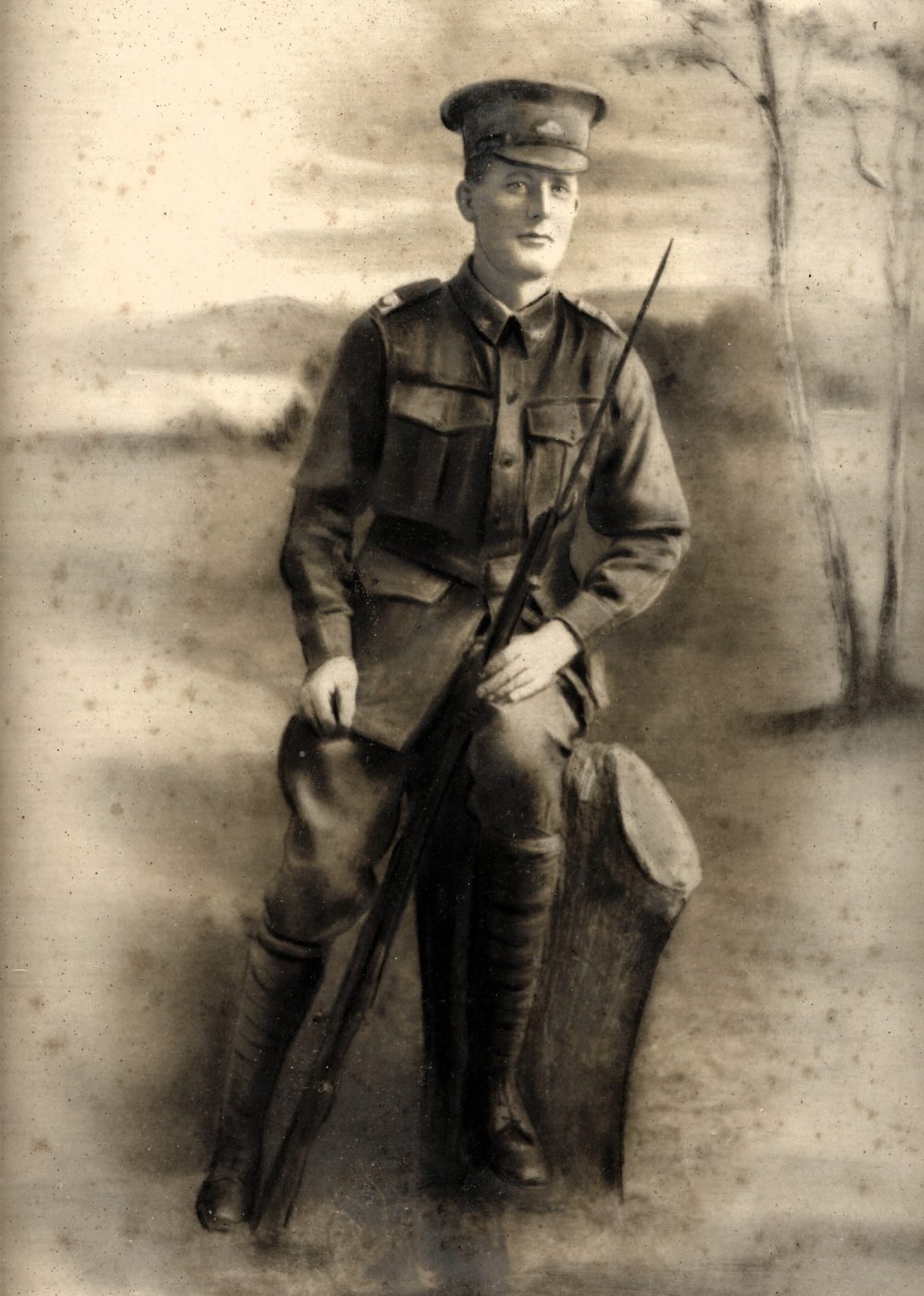Robert Gibson’s Letter Home
This letter was one of a series written home to his family by Robert Gibson from the battle front in Belgium in WWI.
He survived the battle of Messines Ridge, Passchendaele, Villiers-Bretonneux and AMIENS. Robert was one of 3 brothers that served in the Upper Manning, Knorrit Flat.
His two brothers were Willie and Alick (Alexander).
Alick died in EGYPT 19.4.17
YMCA in the Field 20/2/18
Just a few lines to let you know that I am alive. One wants a lot of luck to live long out here. I am on 14 days leave in London just now. It is grand to be away from the roar of guns for a while. I am going to try and tell you a little about our life in France. It is impossible to write about it in France. The censors won’t allow it.
I have been nearly twelve months in France and it has been hell all the time. Anyone who has not been through it can’t imagine what it is like. I’m afraid I can’t find words to tell you but I’ll do the best I can.
I suppose you have read about the Battle of Messines. I went through it from start to finish. It was about the best victory we have had in France. It was on the eve of the battle that I received your cable that poor Alick (his brother) had been killed. I’ll never forget that night. It was a night of sorrow for me. The news of Alick’s death had upset me that way I hardly knew what I was doing. I went through hells fore that night but escaped with a few scratches and a shaking up.
When we were marching up to the battle line we had to pass through a very heavy shell fore and gas here and there. I could see bodies lying just where they fell, but I think the most trying time is when we are all lined up in the trenches waiting to go over the top. I think the bravest feel a bit strange. I have seen brave men turn pale when the word was passed along one minute to go. When our mines went off most of us imagined the end of the world had come. The earth shook for miles around. It was a signal for our guns and they opened up with a roar that was heard for over a hundred miles away. The sky was lit up by the flash of thousands of guns. It was a great sight at a safe distance.
We went over the top with a rush. Away in front of us we could see our own barrage. It was just one line of fire and it crept forward – I saw some terrible sights while going across the shell swept battlefield.
I saw my best mates smashed and battered that way it made me sick to look at them. The Germans got it bad from out shell fore and they got no quarter from us. A man will do things in the madness of battle that he will never think of doing any other time. Well Mother, for five days we fought and worked and then came out for a few days rest. I was sleepy, tired and sick from gas and other horrible smells from dead men who had been lying about for weeks. The Germans don’t bother much about the dead. I think it is terrible to leave them lying about unburied.
When we went back to the trenches we had to bury hundreds of dead that had been lying about for three weeks. You can just imagine what it would be like. It used to make one sick every time.
Well Mother, I’, afraid that I’ll be making you sick if I write any more about this sort of thing. I could go on writing for a week and not be able to tell you all that I have been through. Since I have been over here my nerves have just about gone. I’ll never be the same as I used to be. Give all that I’, worth to be back in Australia again. I don’t know what we are fighting for. The Red Cross who sit back at a safe distance are the only ones that get any praise; that is the head officers. They were all decorated after Messines but what about us? We went through hells flames and were scorched and burnt. What did we get? Nothing, not even a kind word. Thousands of Australians lie dead on the battle fields of France and who gets all the praise after the great deeds they have done! Billy Hughes. He never had the pluck to come over and have a look at us in France. Holman did come over and nearly lost his life the time Major General Holmes got killed.
Well Mother I voted No on the conscription bill and IU think most of the other lads over here did the same. I could never force another man to come over here and go through hell. If we got a fair deal it would be a different thing, but we don’t. They put us into all the rough places. Don’t take any notice of what you see in the papers. They put ANZACS MOST GLORIOUS DAY IN FRANCE. If getting killed by the thousands is glorious, it was glorious in the Ypres battle. My battalion came out 200 strong out of a thousand. It breaks my heart when I think of it.
In July last we went over the top to take a strong post. We had 84 men. Out of all of them only twelve came back without getting hit. All the rest killed or wounded. I’ll never forget that night. I lay out in no man’s land for three hours; then I managed to get back to our trenches. I had to go through a hail of bullets and shell fire. I had to do it on my hands and knees. My right leg was too sore to walk on; and I’m afraid if you had seen me then you would not have known me. I was smothered in mud and blood.
Well Mother, I’m afraid I’ll only be making it worse for you if I go on writing like this. If I should ever get home again I will be able to tell you a lot more that I can in a letter. I met Billy Mills today. It puts me in mind of old times, to be talking about London with him. He looks well. I’m glad they won’t let him go over to France, I’m, going back in two days time. I don’t know if I will ever get through the terrible fighting that is going to take place this summer. I’m not afraid to die but I would like to see you all again. Well Mother don’t worry about me. If I do go under it will be with my face towards the enemy.

